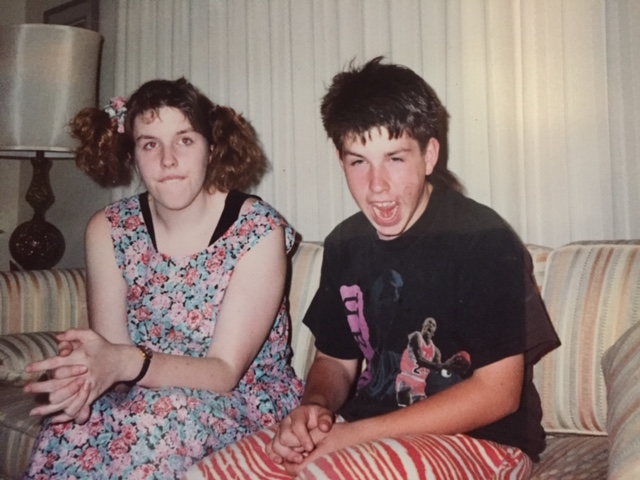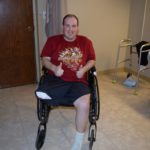Early morning phone calls are rarely a good thing. Two weeks ago, I woke to my cell phone ringing. My mom was calling to let me know that my brother had been taken to the hospital.
It started off as the flu.
Then his foot was swollen.
The next day he couldn’t walk on his foot.
The day after that he was being rushed into surgery.
My brother told my mom that he was pretty sure he was going to lose a few toes. Since my mom doesn’t live out here, she was trying to decide if she should fly back to be with him. We debated what his recovery would be like, and she ended up booking a flight that afternoon. Although he had said he would be okay, we decided that a hug and some tender loving care from his mother was in order.
After I hanging up, I freaked out a little-how does that happen? How do you just end up losing a few toes? We called the hospital where he was taken by ambulance-and he wasn’t there. The hospital suggested that we try calling his home. Maybe he had gone home. I started to wonder if my mom had a horrible nightmare, was she demonstrating signs of dementia? Still, I knew my brother had been sick-and that his foot had been bothering him.
So I started calling hospitals. Turns out they can tell you if a patient is staying there. I know, because I had to call five before I found my brother. The person on the phone said that Scott’s nurse was busy-but she would call as soon as she was able. They said he was in the burn unit. That was confusing. I wondered if they had to cauterize his toes somehow?
It took about three hours for the nurse to call back. I explained that I wasn’t sure exactly what had happened-or how he had ended up at that hospital.
She explained that my brother was stable but intubated. They were hoping to extubate him later that afternoon. When he was taken to the ER they found a sore that had become infected on his foot. When they x rayed his leg, they found that gas bubbles were forming. “Gas bubbles,” she said, “are very bad.” And then she said something I wasn’t prepared to hear. “So his right leg was amputated above the knee.”
Not toes. A whole leg. And that’s how quickly everything can change.
The next few days were beyond difficult. Seeing my brother, picking up my mom from the airport. Telling her what had actually happened. Seeing my brother again. Seeing him try to figure out what he could have done differently. Seeing his anxiety but also seeing his resiliency. He will be okay. Because the alternative is unthinkable. It will be different but eventually, okay.
It feels like standing at the edge of the cliff-you can see across and how it will look in the future. Different. I can see my brother coming over for Christmas with his prosthetic leg. At the same time, it feels like you could fall into the cliff and never come back out. But you don’t. You get on a shaky bridge and start working your way towards the other side.

We have a lot to be grateful for. The fact that the surgeons were able to save my brother’s life. They have showed compassion and caring. The head of the burn/wound unit even called my brother to find out how he was doing and asked what he could do to help. He sent him a book with a lovely note so that my brother would have a way to pass the time. I have been so impressed with my colleagues in PT and OT who come and push him just enough-so that eventually he will be strong enough to use a prosthetic. And I’m thankful for my brother’s resilience. When he is told he only has to do one more rep, he tries to do two.

My brother and I sometime in the eighties. We amused ourselves by dressing up weird and taking our picture. I couldn’t find the one where I dressed him up as an old lady and introduced him as my cousin.
I wrote a few months ago about how I changed how I communicate evaluation results with my families. For a long time I’ve thought about doing some posts about the stages of grief-and how these can impact how a family or individual in their daily life. Are there things that we can do or say as professionals to help our families move through these stages? I’ve got a few posts scheduled in the upcoming weeks on multiple meaning words. But after that, I want to take some time to explore parent coaching as well as our role in counseling as speech language pathologists.
**Update: My brother was able to be moved to a rehabilitation center at the beginning of this month. He is slowly increasing his strength and learning how to transfer from his bed to his wheelchair and how to stand in a walker. He is hoping that he can come home to live with us sometime in April while he continues to recover.



My prayers to you and your family. Strong family and friend support is so crucial to recovery. I think often times we as speech people are often the first ones that families have contact with- before social workers or case workers and we often have contact more often with the families during the course of therapy. I look forward to your thoughts on our role in counseling.
Thank you for sharing. I look forward to your upcoming posts
Very scary. Thanks for sharing and would love to read more posts about counseling and our role.
Sorry to hear about your family’s struggles. Wishing you all strength (and love and laughter) in the months ahead.
Thank you so much!
You and your family are in my thoughts and prayers.
Thank you!
Thanks for sharing. Your family will be in my prayers.